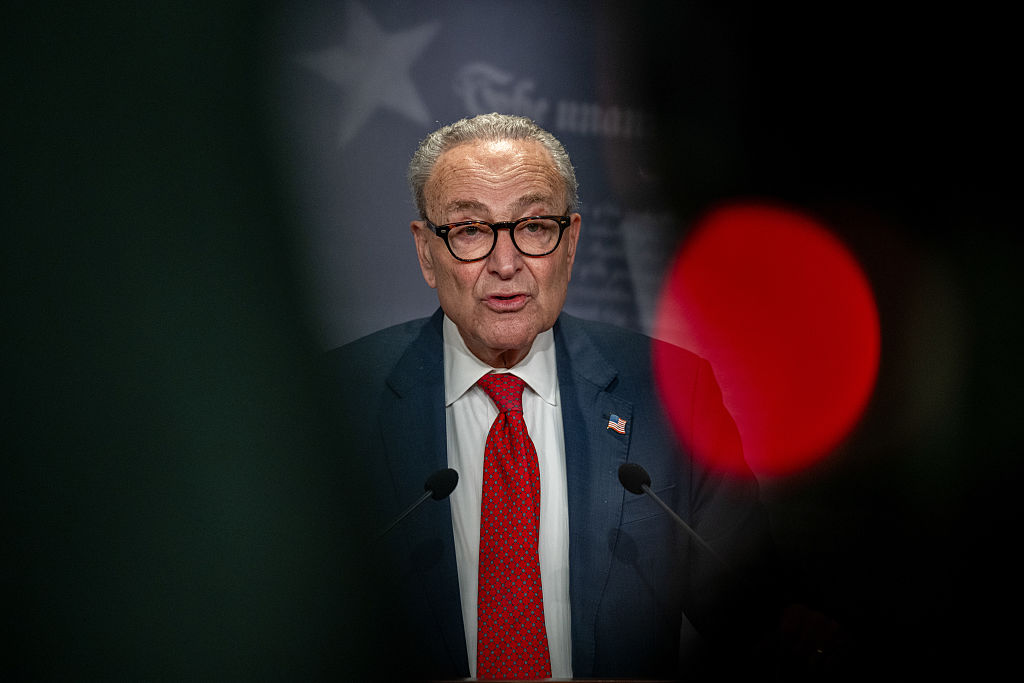The yearlong rift within the Democratic Party over how far to go in confronting President Donald Trump reopened on Sunday night, when eight members of the Senate Democratic Caucus sided with Republicans on a bill to end the government shutdown without a pledge to protect the health insurance tax credits they had spent weeks arguing were a crucial part of any deal.
[time-brightcove not-tgx=”true”]
The move, which effectively broke the party’s 40-day standoff with Republicans, plunged Senate Minority Leader Chuck Schumer into perhaps the deepest political crisis of his eight-year tenure as a party leader, even though he voted against the bill and made clear he didn’t support it. Within hours of the vote, progressives were calling for his resignation, accusing him of presiding over a collapse in party discipline and of failing to channel the energy that fueled Democrats’ sweeping victories in last week’s elections.
The intensity of the backlash reflected how profoundly the monthlong shutdown—and the way it ended—has come to symbolize the Democratic Party’s broader struggle over how to confront Trump. For many liberals, the standoff was a test of resolve, a chance to prove that Democrats could match the President’s appetite for confrontation and hold firm until Republicans agreed to extend the Affordable Care Act’s enhanced tax credits. But to others, the shutdown had become an exercise in futility.
“Standing up to Donald Trump didn’t work. It actually gave him more power,” Sen. Angus King, a Maine Independent who caucuses with the Democrats, said on MSNBC a day after he voted for the Republican bill, which he had supported from the start. He noted that Trump had used the shutdown to target programs favored by Democrats, including by refusing to fund the Supplemental Nutrition Assistance Program despite multiple court orders.
To many on the left, however, that approach amounted to surrender and effectively throwing away any leverage just as the White House faced mounting pressure to yield. “America deserves better,” California Gov. Gavin Newsom wrote on X, adding in a later post that “now is not the time to roll over.”
“Accepting nothing but a pinky promise from Republicans isn’t a compromise—it’s capitulation,” added Texas Rep. Greg Casar, chair of the Congressional Progressive Caucus, in a statement.
A handful of House Democrats publicly called on Senate Democrats to pick a new leader.
“The Democratic Party needs leaders who fight and deliver for working people. Schumer should step down,” said Rep. Rashida Tlaib, a Michigan Democrat.
“Senator Schumer is no longer effective and should be replaced,” added Rep. Ro Khanna, who represents the Silicon Valley region of California. “If you can’t lead the fight to stop healthcare premiums from skyrocketing for Americans, what will you fight for?” Rep. Seth Moulton, a Massachusetts Democrat who is running for the Senate, said, “Tonight is another example of why we need new leadership.”
The criticism echoes the backlash Schumer faced in March, when he supported a Republican spending bill to avert an earlier shutdown, prompting many of the same progressives to accuse him of capitulating too easily. At the time, Schumer argued that keeping the government open was the responsible course, warning that a prolonged impasse would ultimately strengthen Trump’s hand. The latest revolt suggests that months later, the party’s rift over how to confront the President has only deepened.
In remarks ahead of the Senate vote Sunday, Schumer said Democrats had been united in demanding protections for millions of Americans who rely on those subsidies, but that Republicans refused to negotiate in good faith. “This health care crisis is so severe, so urgent, so devastating for families back home that I cannot in good faith support this CR that fails to address the health care crisis,” Schumer said.
Almost immediately, some progressive groups and leaders were dismissing his opposition as a performance, suggesting he might have helped organize the deal himself. “If he secretly backed this surrender and voted ‘no’ to save face, he’s a liar. If he couldn’t keep his caucus in line, he’s inept,” said Joseph Geevarghese, the executive director of Our Revolution, the political group launched by progressive Senator Bernie Sanders in 2016. “Either way, he’s proven incapable of leading the fight to prevent health care premiums from skyrocketing for millions of Americans. The country can’t afford his failed leadership any longer.”
Some of Schumer’s Democratic allies were quick to defend him, noting that he held his caucus together for nearly six weeks and extracted some concessions from Republicans. “Yes and yes,” House Minority Leader Hakeem Jeffries, also of New York, said Monday when asked if Schumer remained an effective leader. “The overwhelming majority of Senate Democrats led by Chuck Schumer waged a valiant fight.”
Many in the party are bracing for support for Schumer to become an issue in Senate races around the country. Whether he can weather the storm remains uncertain. He turns 75 in November and is already facing grumbling within his caucus about generational change, especially after Rep. Nancy Pelosi, the former Democratic House Speaker, announced her retirement from Congress last week. In his home state of New York, where a newly energized progressive movement just swept Zohran Mamdani into the mayor’s office, some activists are openly encouraging Rep. Alexandria Ocasio-Cortez to challenge Schumer when his Senate seat is up in 2028.

